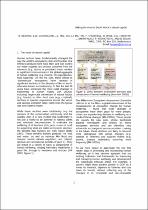JavaScript is disabled for your browser. Some features of this site may not work without it.
- ResearchSpace
- →
- Research Publications/Outputs
- →
- Conference Publications
- →
- View Item
| dc.contributor.author |
Reyers, B

|
|
| dc.contributor.author |
Van Wilgen, BW

|
|
| dc.contributor.author |
Nel, JL

|
|
| dc.contributor.author |
Le Maitre, David C

|
|
| dc.contributor.author |
O'Farrell, Patrick J

|
|
| dc.contributor.author |
Wise, R

|
|
| dc.contributor.author |
Forsyth, GG

|
|
| dc.contributor.author |
Smith-Adao, Lindie B

|
|
| dc.contributor.author |
Ntshotsho, Phumza

|
|
| dc.contributor.author |
Egoh, Benis N

|
|
| dc.date.accessioned | 2008-11-13T08:13:21Z | |
| dc.date.available | 2008-11-13T08:13:21Z | |
| dc.date.issued | 2008-11 | |
| dc.identifier.citation | Reyers, B, Van Wilgen, BW, Nel, JL., et al. 2008. Making the most of South Africa’s natural capital. Science real and relevant: 2nd CSIR Biennial Conference, CSIR International Convention Centre Pretoria, 17&18 November 2008, pp 12 | en |
| dc.identifier.uri | http://hdl.handle.net/10204/2538 | |
| dc.description | Science real and relevant: 2nd CSIR Biennial Conference, CSIR International Convention Centre Pretoria, 17&18 November 2008 | en |
| dc.description.abstract | Human actions have fundamentally changed the way the world’s ecosystems look and function. Our efforts to produce more food, fibre, and fuel, control our water supplies and protect ourselves from the elements (e.g. storms or predators) have resulted in significant improvements in the global aggregate of human wellbeing (e.g. income, life expectancies, food supplied). On the flip side, these efforts to “domesticate” ecosystems have resulted in significant declines in the diversity of life on earth, otherwise known as biodiversity. In fact the last 50 years have witnessed the most rapid changes in biodiversity in human history (MA 2005a), including: large-scale conversion of natural habitat (e.g. forests) to other land uses (e.g. cropland), declines in species populations across the world, and species extinction rates 1000 times the typical rate over Earth’s history. While these declines were traditionally only the concern of the conservation community and the wealthy elite, it is now evident that biodiversity is not just a nicety to be admired in national parks and television documentaries. It underpins the wellbeing of all humans (rich, poor, urban or rural) by supporting what are called ecosystem services: the benefits that humans get from nature (Daily 1997). These benefits include products like food and water, as well as services like flood and disease control, climate regulation, and cultural, spiritual and recreational benefits (Figure 1). They are linked in a variety of ways to components of human wellbeing, ranging from basic material for a good life, through to freedoms and choices (MA 2003; Figure 1) | en |
| dc.language.iso | en | en |
| dc.subject | South Africa’s natural capital | en |
| dc.title | Making the most of South Africa’s natural capital | en |
| dc.type | Conference Presentation | en |
| dc.identifier.apacitation | Reyers, B., Van Wilgen, B., Nel, J., Le Maitre, D. C., O'Farrell, P. J., Wise, R., ... Egoh, B. N. (2008). Making the most of South Africa’s natural capital. http://hdl.handle.net/10204/2538 | en_ZA |
| dc.identifier.chicagocitation | Reyers, B, BW Van Wilgen, JL Nel, David C Le Maitre, Patrick J O'Farrell, R Wise, GG Forsyth, L Smith-Adao, P Ntshotsho, and Benis N Egoh. "Making the most of South Africa’s natural capital." (2008): http://hdl.handle.net/10204/2538 | en_ZA |
| dc.identifier.vancouvercitation | Reyers B, Van Wilgen B, Nel J, Le Maitre DC, O'Farrell PJ, Wise R, et al, Making the most of South Africa’s natural capital; 2008. http://hdl.handle.net/10204/2538 . | en_ZA |
| dc.identifier.ris | TY - Conference Presentation AU - Reyers, B AU - Van Wilgen, BW AU - Nel, JL AU - Le Maitre, David C AU - O'Farrell, Patrick J AU - Wise, R AU - Forsyth, GG AU - Smith-Adao, L AU - Ntshotsho, P AU - Egoh, Benis N AB - Human actions have fundamentally changed the way the world’s ecosystems look and function. Our efforts to produce more food, fibre, and fuel, control our water supplies and protect ourselves from the elements (e.g. storms or predators) have resulted in significant improvements in the global aggregate of human wellbeing (e.g. income, life expectancies, food supplied). On the flip side, these efforts to “domesticate” ecosystems have resulted in significant declines in the diversity of life on earth, otherwise known as biodiversity. In fact the last 50 years have witnessed the most rapid changes in biodiversity in human history (MA 2005a), including: large-scale conversion of natural habitat (e.g. forests) to other land uses (e.g. cropland), declines in species populations across the world, and species extinction rates 1000 times the typical rate over Earth’s history. While these declines were traditionally only the concern of the conservation community and the wealthy elite, it is now evident that biodiversity is not just a nicety to be admired in national parks and television documentaries. It underpins the wellbeing of all humans (rich, poor, urban or rural) by supporting what are called ecosystem services: the benefits that humans get from nature (Daily 1997). These benefits include products like food and water, as well as services like flood and disease control, climate regulation, and cultural, spiritual and recreational benefits (Figure 1). They are linked in a variety of ways to components of human wellbeing, ranging from basic material for a good life, through to freedoms and choices (MA 2003; Figure 1) DA - 2008-11 DB - ResearchSpace DP - CSIR KW - South Africa’s natural capital LK - https://researchspace.csir.co.za PY - 2008 T1 - Making the most of South Africa’s natural capital TI - Making the most of South Africa’s natural capital UR - http://hdl.handle.net/10204/2538 ER - | en_ZA |






